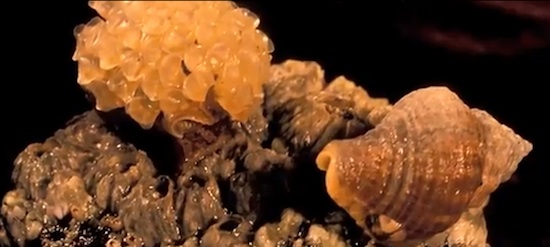Marine Whelk Snails Are The Ocean’s Daddy Day Care, But Less Awful
Marine whelk snails carry their young on their back, toting their eggs around for weeks after mating. The notion is not actually that uncommon under the seas — male pipefish and seahorses are also known to take on surprisingly active paternal roles, like gestating their own young. However, a recent analysis of marine whelk eggs by researchers at UC Davis showed something surprising — the whelks aren’t just carrying their own kids on their back, but offspring from as many as 25 other males.
Eggs fertilized by the male’s own DNA may make up just 25% of the whole baby load they’re carrying. Even worse, early hatching whelk snails continue to develop by eating their unborn brothers and sisters, so only a few of the hundreds of eggs carried by the male will make it to maturity. That means only about 1 in 4 of the snails the proud papa finally rears after a month of carrying them around on his back will be biologically his. The results of the study, published in the journal Ecology Letters, mark the first time the male of any species has been found raising young other than his own.
Whelk eggs need an anchor to keep from being set adrift and turned into a delicious, high protein snack for other animals. But in the marine whelk’s stomping grounds — the mudflats off the coast of Baja California — suitable rocks are few and far between. So after mating, the female marine whelk deposits a fertilized egg capsule on the next best thing, attaching it to the back of her most recent paramour.
Since both male and female whelk snails are amazingly promiscuous — there’s really just not a lot else to do on tidal flats — the snails can end up carrying multiple egg capsules on their backs. Each capsule can contain hundreds of eggs, and those eggs can be fertilized by dozens of different males. The biological cost of carrying those eggs is high for the male — they spend a lot of energy carrying the eggs, and make better targets for predators like birds, but researchers suspect the cost is outweighed by the benefit of being able to mate, suggesting that males who are willing to carry the load for others may show themselves to be good dads, getting more opportunities to mate in the first place.
Check out the video below for more details from the researchers.
(via ScienceDaily, image courtesy of UC Davis)
- This is way more charming than cone snail
- Or this amber snail
- On a stepdad’s back is nowhere near the weirdest way snails travel
Have a tip we should know? tips@themarysue.com
